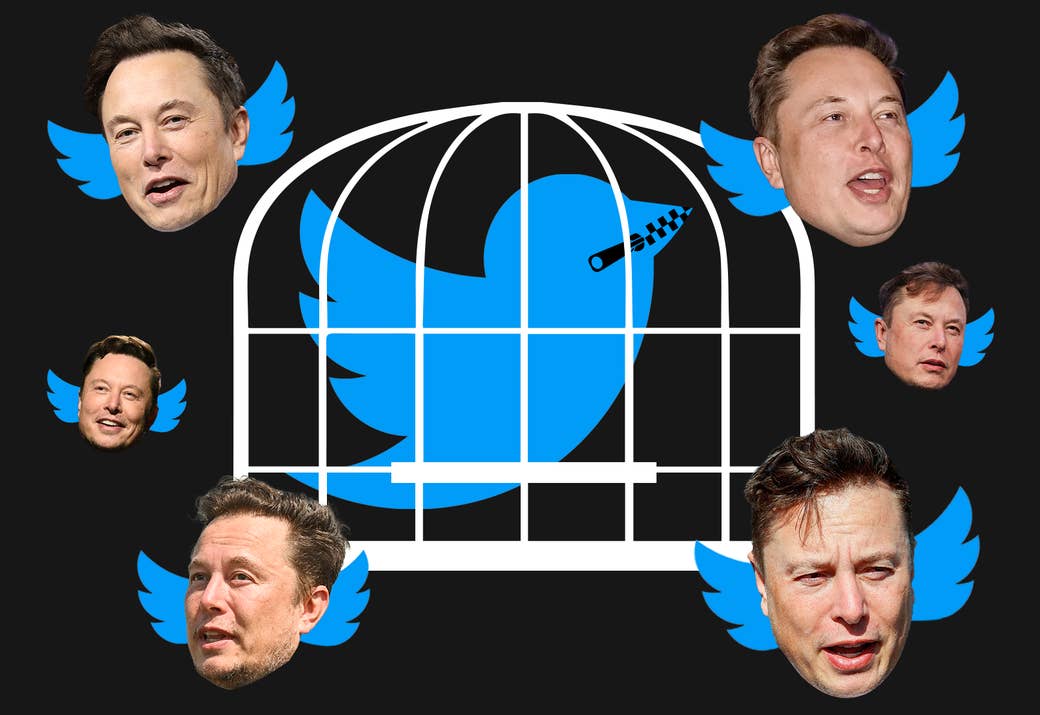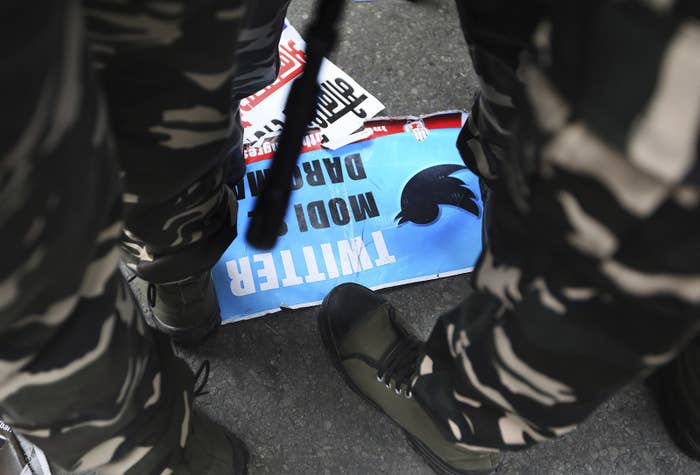
Elon Musk — a busy dad, Twitter’s maybe (or maybe not?) owner, and the world’s richest man — calls himself a “free speech absolutist.” He wants to just let people tweet, no matter how bad or racist or anti-gay those tweets might be.
But for months, Musk has been doing exactly what he’s accused the blue checks of: getting too up his own ass in American Twitter’s internecine culture wars to notice the real-world, life-and-death stakes over free speech that are unfolding outside the United States, where most people who use the service live.
In April, just a day after Musk claimed that he wanted to buy Twitter because he supports free speech, he added a caveat: "By ‘free speech’, I simply mean that which matches the law," he tweeted. "I am against censorship that goes far beyond the law." A few weeks later, he doubled down. “My preference is to hew close to the laws of countries in which Twitter operates,” he tweeted at far-right conspiracy theorist Mike Cernovich. “If the citizens want something banned, then pass a law to do so, otherwise it should be allowed.” Perhaps he has forgotten that in countries with the most repressive censorship and severely restricted speech, it's usually not the case that the citizens wanted it that way.
To Musk, “free speech” means the American constitutional right to be an asshole. But that’s not what free speech means in a global sense. For the last few years, Twitter has already been fighting for free speech on its platform, including in at least two cases in the US and more frequently in the rest of the world, where authoritarian regimes are trying to shut down criticism on social media.
Just look at what’s happening in India, a country that I lived in until last year, when my fun job writing about tech suddenly turned into writing about tech and borderline fascism. For years, the country has been a big and important market for Twitter outside the US.
On Tuesday, Twitter sued India’s government led by the Hindu nationalist prime minister Narendra Modi, which has increasingly been trying to control what more than 800 million internet-connected Indians can see, watch, say, write, or hear on social media. With this lawsuit, Twitter is doing what Musk says he wouldn’t: fight for free speech against a country’s laws.

Twitter’s suit comes a year and a half after the company locked horns with India’s ruling Bharatiya Janata Party over accounts and tweets (some of them from politicians and journalists) that criticized the government’s record of civil liberties and human rights violations and its mishandling of the coronavirus pandemic. In February 2021, Twitter permanently suspended more than 500 accounts and withheld an unspecified number of others from being viewed in India. But the company struck a defiant note by telling India’s government that despite federal orders, it wouldn’t ban accounts that belonged to journalists, activists, and politicians. Police have since raided the social network’s New Delhi headquarters, and some government officials have defected to Koo, an Indian Twitter clone with questionable content moderation policies.
This past Monday, India’s IT ministry gave Twitter a final chance to comply with its orders to remove content and block accounts from being viewed in the country or face consequences under draconian new laws passed last year, which include up to seven years in prison for company officials. Twitter complied with the orders and then challenged them in court the very next day.
To Musk, “free speech” means the American constitutional right to be an asshole.
In a summary of Twitter’s suit viewed by BuzzFeed News, the company argues that the government’s orders are disproportionate and are an excessive use of powers. Some of the government’s orders, the suit says, seek to restrict political speech, criticism, or tweets that are newsworthy and aren’t illegal in India.
Look, this doesn’t mean that Twitter has it all figured out (it clearly doesn’t), or even that it has never fucked up in India. It’s been slow and inconsistent in enforcing its own policies; even in 2022, it lets all kinds of despicable content from members of the Indian far right who hate religious minorities exist. Twitter once let dozens of tweets doxing interfaith couples in the country stay up for two months and didn’t take them down until public outcry. It let a tweet that asked for journalists and Muslims to be lined up and shot stay up for over 24 hours. Members of its leadership team have been shockingly ignorant of deeply entrenched caste biases that shape Indian society.
But at a time when Meta and Google have often caved, Twitter has become a surprisingly aggressive free speech warrior.
Indeed, India isn’t the only country where Twitter has taken legal risks to protect speech. For more than a year, in defiance of a Turkish court order, it let a tweet from a Turkish lawyer linking to a news story critical of an ally of President Recep Tayip Erdogan’s stay up. In Russia, it refused to censor content in support of opposition leader Alexei Navalny. In retaliation, Russia throttled the website till it nearly ground to a halt.
Like your garden-variety Silicon Valley tech bro, Musk claims to care deeply about free speech.
Free speech is essential to a functioning democracy. Do you believe Twitter rigorously adheres to this principle?
But his limited understanding of free speech issues, as demonstrated in his tweets, means that a social network he owns won’t choose to fight these battles around the world but instead follow local policies no matter how restrictive they might be. In countries like India, Russia, Turkey, and others, his blinkered definition of free speech would actually mean less free speech for millions of people.
Musk, who is trying to fund his $44 billion Twitter acquisition with help from countries that have historically suppressed free speech, like Saudi Arabia and Qatar, did not respond to a request for comment from BuzzFeed News about Twitter’s lawsuit to keep tweets online in India.
Sources familiar with the lawsuit told BuzzFeed News that Twitter deemed threats from the government to jail company officials serious enough to sue. But a Twitter spokesperson told BuzzFeed News that the company was also doing this to protect people’s rights.
“The threat to Twitter is one thing, but free speech online is much bigger than just the organization,” they said. When asked about Musk’s views on free speech, the spokesperson refused to comment “on anything to do with the acquisition” and said that the company “can’t speculate on what a future owner of Twitter may or may not do with the service.”
Far from acknowledging Twitter’s efforts to fight for people’s right to tweet, Musk has, instead, accused its leadership of censorship. He has amplified criticism from the American far right against Vijaya Gadde, a top India-born executive who has shaped Twitter’s global speech policies, which included permanently banning former president Donald Trump. “I think that [the ban on Trump] was a mistake,” Musk has said. “I would reverse the permaban.” His tweet, which included a photo of Gadde’s face along with a suggestion of “left wing bias,” directed a barrage of racist abuse toward Gadde and Twitter CEO Parag Agrawal, who was also born in India. In another tweet, Musk presented Agrawal as Soviet dictator Joseph Stalin, who was notorious for censorship.
“Twitter obv has a strong left wing bias,” he tweeted at Cernovich.
Musk, a rich and powerful white man, has also used Twitter to mock people who list their pronouns in their bios, lash out at journalists who are critical of Tesla, call coronavirus lockdowns “fascist,” compare Canadian Prime Minister Justin Trudeau to Hitler (in a tweet he deleted later), and call a British diver who saved a team of soccer players from a flooded cave in Thailand “pedo guy.”
“If he’s looking for legitimate cases of censorship to protest, India offers an excellent chance for Musk to put his mouth where his money is,” Platformer’s Casey Newton wrote in his newsletter.
But more likely than not, Musk’s thinking is stifled by an insular, American-only attitude. If he buys Twitter, the social network could roll back its progress on free speech issues that actually matter around the world. ●
